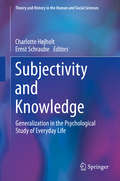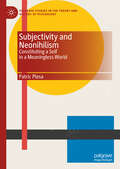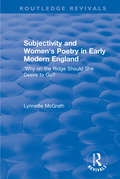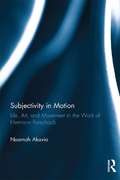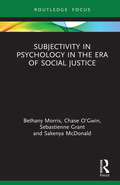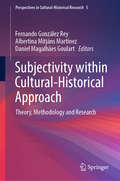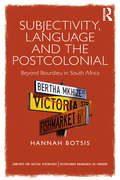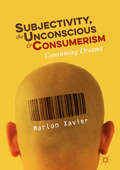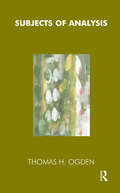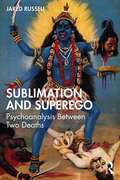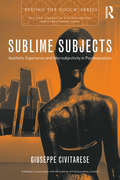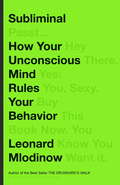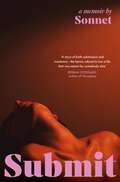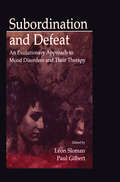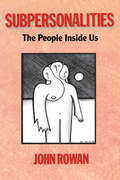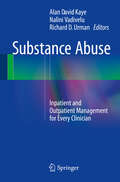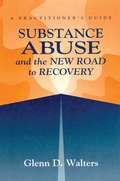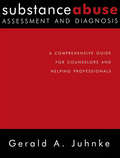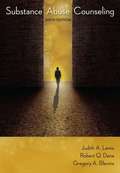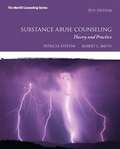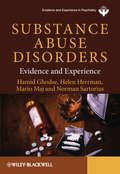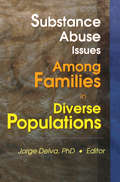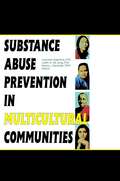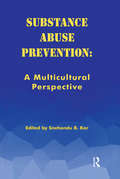- Table View
- List View
Subjectivity and Knowledge: Generalization in the Psychological Study of Everyday Life (Theory and History in the Human and Social Sciences)
by Ernst Schraube Charlotte HøjholtBased on a collection of chapters of leading scholars in the field, the purpose of this book is to intervene in current debates on the scientific foundation of psychological theory, methodology and research practice, and to offer an in-depth, situated and contextual understanding of psychological generalization. This book aims to contribute to a theoretical and methodological vocabulary which includes the subjective dimension of human life in psychological inquiry, and roots processes of generalization in persons’ common, social, cultural and material practices of everyday living. The volume is directed to students, professors, and researchers in psychology as well as to scholars in other branches of the humanities and social science where psychology and especially subjectivity, everyday practice and the development of psychological knowledge is an issue. The volume will be of particular interest to scholars in the field of cultural psychology, critical psychology, psychology of everyday life as well as psychological methodology and qualitative studies of everyday life including the various critical undergraduate, graduate, master, and PhD programs. The book will also be of special interest for scholars working in social psychology, history of psychology, general psychology, theoretical psychology, environmental psychology and political psychology.
Subjectivity and Neonihilism: Constituting a Self in a Meaningless World (Palgrave Studies in the Theory and History of Psychology)
by Patric PlesaSubjectivity and Neonihilism examines the current Western sociopolitical climate, revealing how it shapes who we are, how we think of ourselves, and how we create meaning in a seemingly meaningless world. Drawing on critical theory, this book looks at some of the social inequities produced under neoliberal capitalism and the ways these problems are internalized into subjectivity as the neoliberal self. Neoliberal cultural values are shown to reframe social inequities as personal problems and simultaneously create a sense of personal responsibility for solving them within the self, rather than addressing them externally. The author argues that current crises in meaning making and mental health have been exacerbated by the neoliberal values of individualization, responsibilization, self-governance, and competition. Divided into 3 parts, this book begins by outlining the emergence of subjectivity and technologies of the self. It demonstrates how the sociopolitical conditions that amplify social inequities intwine with the hyperawareness of the internet age to create an atmosphere of meaninglessness that is pervasive on social media and in internet culture. In part 2, the author further analyses this phenomenon, here labelled &‘neonihilism&’, as the process in which we confront meaninglessness through irony, questioning whether this might hold the intrinsic condition for overcoming this new nihilism. Part 3 examines the possibility for collective meaning making, solidarity, and collective action afforded by creating an art of nihilating the neoliberal self, or what the author terms &‘the ars nihil&’, via subversion and resistance. This book offers fresh insights that will be of interest to students and scholars of critical theory, psychology, philosophy and sociology.
Subjectivity and Women's Poetry in Early Modern England: Why on the Ridge Should She Desire to Go? (Routledge Revivals)
by Lynnette McGrathThis title was first published in 2002: Combining the approaches of historic scholarship and post-structural, feminist psychoanalytic theory to late 16th- and early 17th-century poetry by women, this book aims to make a unique contribution to the field of the study of early modern women's writings. One of the first to concentrate exclusively on early modern women's poetry, the full-length critical study to applies post-Lacanian French psychoanalytic theory to the genre. The strength of this study is that it merges analysis of socio-political constructions affecting early modern women poets writing in England with the psychoanalytic insights, specific to women as subjects, of post-Lacanian theorists Luce Irigaray, Helen Cixous, Julia Kristeva, and Rosi Braidotti.
Subjectivity in Motion: Life, Art, and Movement in the Work of Hermann Rorschach (Routledge Monographs in Mental Health)
by Naamah AkaviaThe motif of human movement has long been understood as central to Hermann Rorschach’s strikingly innovative inkblot experiment. But owing to Rorschach’s untimely death a year after publishing his famous work, Psychodiagnostics, the world has lacked an adequate understanding of how he came to put so much stress on human movement in his unique perceptual theory. Now historian Naamah Akavia changes that with her illuminating study of the intellectual and clinical development of this Swiss pioneer. Based on new archival researches and an unprecedented appreciation for Rorschach’s milieu and his times, Subjectivity in Motion: Life, Art, and Movement in the Work of Hermann Rorschach is destined to become an instant classic in the history of psychology and psychiatry—and an important new contribution to our understanding of how movement figures in modernity generally. The historian will appreciate the intricate analysis of Rorschach’s engagement with a wide variety of figures and movements ranging from Mourly Vold and Freud to Jung and Eugen Bleuler, from schizophrenia to Russian Futurism and Eurhythmics, from the word association experiment to the works of Alfred Kulbin and Ferdinand Hodler. But it is the psychologist who will benefit most profoundly from this richly detailed exploration, for the topic of human movement, how it is perceived, and how that figures in personality generally will never quite look the same again.
Subjectivity in Psychology in the Era of Social Justice
by Bethany Morris Chase Kelly O'Gwin Sebasteinne Grant Sakenya McDonaldThe notion of social justice permeates much of current Western political and cultural discourse with a newfound urgency. What it means to be socially just is a question Morris et al investigate and interrogate, looking at psychology’s contributions to the subject and considering the practicality of social justice in light of modern subjectivity. The book begins by examining the lack of equity and inclusivity in education and the ways in which psychology has been complicit in the margninalization of oppressed groups. Drawing upon Lacanian theory, it goes on to discuss how diversity initiatives take on an obsessive-neurotic characteristic that can stifle those it claims to understand and promote .The authors investigate the anxiety around the performance of being socially just or "woke" and suggest how psychology can contribute to the development of socially just humans, more attuned to the needs of others, through the appreciation of interconnectivity and compassion. An imperative text for scholars and students of philosophical and theoretical psychology, critical psychology, social psychology, psychoanalysis, social work and education.
Subjectivity within Cultural-Historical Approach
by Fernando González Rey Albertina Mitjáns Martínez Daniel Magalhães GoulartThis book offers a theoretical and epistemological-methodological framework as an alternative approach to the instrumental-descriptive methodology that has prevailed in psychology to date. It discusses the differences between the proposed approach and other theoretical and methodological positions, such as discourse analysis, phenomenology and hermeneutics. Further, it puts forward a proposal that allows the demands of studying subjectivity to be addressed from a cultural-historical standpoint. The book mainly highlights case studies that have been conducted in various countries, and which employ or depart from the theoretical, epistemological and methodological proposals that guide this book. The research discussed here introduces readers to new discussions on theoretical and methodological issues in subjectivity that have increasingly attracted interest.
Subjectivity, Language and the Postcolonial: Beyond Bourdieu in South Africa (Concepts for Critical Psychology)
by Hannah BotsisIn Subjectivity, Language and the Postcolonial, Hannah Botsis draws on theoretical work that exists at the intersection of critical social psychology, sociolinguistics and the political economy of language, to examine the relationships between language, subjectivity, materiality and political context. The book foregrounds the ways in which the work of Bourdieu could be read in conjunction with ‘poststructural’ theorists such as Butler and Derrida to offer a critical understanding of subjectivity, language and power in postcolonial contexts. This critical engagement with theorists traditionally from outside of psychology allows for a situated approach to understanding the embodied and symbolic possibilities and constraints for the postcolonial subject. This exploration opens up how micro-politics of power are refracted through ideological categories such as language, race and class in post-apartheid South Africa. Also drawing on the empirical findings of original research undertaken in the South African context on students’ linguistic biographies, the book offers a unique perspective – critical social theory is brought to bear on the empirical linguistic biographies of postcolonial subjects, offering insight into how power is negotiated in the postcolonial symbolic economy. Ideal for advanced undergraduate and postgraduate students on courses including social psychology, sociolinguistics, sociology, politics, and education, this is an invaluable resource for students and researchers alike.
Subjectivity, the Unconscious and Consumerism: Consuming Dreams
by Marlon XavierSubjectivity, the Unconscious and Consumerism is a unique and imaginative psycho-sociological exploration of how postmodern, contemporary consumerism invades and colonises human subjectivity. Investigating especially consumerism’s unconscious aspects such as desires, imagination, and fantasy, it engages with an extensive analysis of dreams. The author frames these using a synthesis of Jungian psychology and the social imaginaries of Baudrillard and Bauman, in a dialogue with the theories of McDonaldization and Disneyization. The aim is to broaden our understanding of consumerism to include the perennial consumption of symbols and signs of identity - a process which is the basis for the fabrication of the commodified self. The book offers a profound, innovative critique of our consumption societies, challenging readers to rethink how we live, and how our identities are impacted by consumerism. As such it will be of interest to students and scholars of critical psychology, psychoanalysis, sociology, anthropology and cultural studies, but is also accessible to anyone interested in the complex psychology of contemporary subjectivity.
Subjects of Analysis
by Thomas OgdenThis book offers a way of understanding and making use of a critical dimension of the analytic experience that is rarely spoken about by psychotherapists and analysts: the ordinary, moment-to-moment experience of the analyst in the analytic setting.
Sublimation and Superego: Psychoanalysis Between Two Deaths
by Jared RussellThis book integrates a thinking about dilemmas faced in the context of the clinical practice of psychoanalysis today, with contemporary social and political concerns specific to the age of the global consumer marketplace. Beginning with an analysis of the fate of the concept of sublimation in Freud’s work, and its relationship to the elaboration of the concept of the superego in 1923, Jared Russell examines how these concepts provide a lever for integrating psychoanalytic thinking with topics of urgent social concern, beyond the critique of ideology. Taking up topics such as the experience of time, addiction to consumption, and the general consequences of the insinuation of digital technologies at increasingly earlier stages in human development—and thinking these through the lens of what the clinical practice of psychoanalysis teaches us about intimate human relatedness—the book addresses how a philosophically oriented approach to psychoanalysis can illuminate our response to the problems of everyday life under conditions of late capitalism. Drawing on a diverse range of authors such as Freud, Heidegger, Hans Loewald, Christopher Bollas, Lacan, Deleuze and Bernard Stiegler, it is argued that the concepts of sublimation and of the superego must be reinvented with regard to both clinical and critical discourse today if psychoanalysis is to remain relevant to the major issues we face, both individually and collectively, in the twenty-first century. Sublimation and Superego: Psychoanalysis Between Two Deaths stages a unique encounter between philosophy, critical theory and clinical practice that will be of interest to psychoanalysts, scholars of twentieth-century continental philosophy, critical social theorists and mental health practitioners.
Sublime Subjects: Aesthetic Experience and Intersubjectivity in Psychoanalysis (New Library of Psychoanalysis 'Beyond the Couch' Series)
by Giuseppe CivitareseSublime Subjects explores two fundamental questions: what is the start of humanity? When and how does a newborn child become a subject? These are relevant to psychoanalysis not only theoretically, but also in clinical practice, where the issue at stake is how to help the analysand’s mind to grow or, better, to increase the ability to give a meaning to experience. Giuseppe Civitarese here argues that the psychoanalytic theory of sublimation and the aesthetic theory of the sublime are theories of subjectivation that can illuminate each other and give us a better understanding of the birth of the psyche. The aesthetic experience in art and in psychoanalytic practice are concerned with the social constitution of the individual, understood at its pre-reflective, non-verbal or inter-corporeal level. It is at this level that, thanks to the encounter with a receptive other, the turbulences of sensations and proto-emotions become soothing rhythms, proto-ideas or sensible ideas at first and, once words are added, concepts. In Bionian terms, the at-one-ment between mother and baby is a form of primordial abstraction and occurs first in the dimension of the purely sensory and indistinct, and then in the affective space, which nonetheless is always a symbolic space if we take account that sociality is provided for the couple-system by the mother. It is exactly the intersubjective process of elevating toward conceptual thinking, but without ever detaching oneself from the thinking deposited in the body as procedural knowledge, that justifies the definition adopted here of human beings as Sublime Subjects. This book explores these topics not only through the lens of the concept of sublimation or the theory of the sublime, but also through those of masochism, hypochondria, truth and two readings of classical Freudian papers such as the clinical case of Dora and ‘Formulations on the two principles of mental functioning’. Sublime Subjects will appeal to psychoanalysts and psychoanalytic psychotherapists, as well as literature and philosophy scholars.
Subliminal: How Your Unconscious Mind Rules Your Behavior
by Leonard MlodinowLeonard Mlodinow, the best-selling author of The Drunkard's Walk and coauthor of The Grand Design (with Stephen Hawking), gives us a startling and eye-opening examination of how the unconscious mind shapes our experience of the world and how, for instance, we often misperceive our relationships with family, friends, and business associates, misunderstand the reasons for our investment decisions, and misremember important events.Your preference in politicians, the amount you tip your waiter--all judgments and perceptions reflect the workings of our mind on two levels: the conscious, of which we are aware, and the unconscious, which is hidden from us. The latter has long been the subject of speculation, but over the past two decades researchers have developed remarkable new tools for probing the hidden, or subliminal, workings of the mind. The result of this explosion of research is a new science of the unconscious and a sea change in our understanding of how the subliminal mind affects the way we live.Employing his trademark wit and lucid, accessible explanations of the most obscure scientific subjects, Leonard Mlodinow takes us on a tour of this research, unraveling the complexities of the subliminal self and increasing our understanding of how the human mind works and how we interact with friends, strangers, spouses, and coworkers. In the process he changes our view of ourselves and the world around us.
Submit
by SonnetThe shocking and illuminating memoir of an anonymous submissive immersed in the BDSM community, reckoning with the divide between our desires and the expectations and strictures that keep us from pursuing them. Sonnet is a writer. She is a professional with a wide network of important people. She is athletic, creative and successful. She always remembers to send Christmas cards. Sonnet also likes to be caned. She likes to be humiliated. She likes to go into a room blindfolded with ten strangers and have them do whatever they want to her. Sonnet likes whatever you tell her she likes. This is the secret memoir of a submissive. A vivid, electric, stunning account of how one woman gets her kicks. It is all true. This is an experience that can&’t be missed, all we ask is that you SUBMIT…
Subordination and Defeat: An Evolutionary Approach To Mood Disorders and Their Therapy
by Paul Gilbert Leon SlomanMost people now accept that human beings are the product of millions of years of mammalian evolution and, more recently, primate evolution. This landmark book explores the implications of our evolutionary history for theories and therapies of depression. In particular, the focus is on how social conflict has shaped various behavioral and psychophysiological systems. Special attention is given to the evolved mechanisms for dealing with social defeat and subordination in both animals and humans. By linking human depression to the activation of ancient psychobiological programs for dealing with social conflict, one is able to understand the function of depression within groups, family systems, and between individuals and begin to distinguish depressions that may have adaptive functions from those that are the result of maladaptive feedback systems. Although many acknowledge the need for an integrated, biopsychosocial theory of psychopathology, there continue to be great divisions among social, psychological, and biological approaches. Sloman and Gilbert have brought together leading scientists and clinicians representing different disciplines and schools to present a provocative new evolutionary model of depression. This model illuminates old problems in new ways, links a common disabling condition to evolved mental mechanisms, and points to potential new approaches to prevention and intervention. The book will be of compelling interest to all those who study or treat mood disorders.
Subpersonalities: The People Inside Us
by John RowanWe all have had the experience of being divided, of being in two minds' about something - one part of us wants to do this, another wants to do that. Subpersonalities is the first book to do justice to the phenomenon as a normal feature of our psychological life. John Rowan argues that we all have a number of personalities that express themselves in different situations and that by recognising them we can come to understand ourselves better and improve our relationships with others. Anyone reading this book will run the risk of making quite new discoveries about themselves. In looking at where subpersonalities come from, John Rowan explores the work of psychologists and psychotherapists, from Jung and Freud onwards, and adds insights gained from his own work as a therapist and counsellor. He relates the journey of discovery that he himself undertook in search of his own subpersonalities. The result is a fascinating book that challenges our accepted view of ourselves and provides an intriguing picture of how human beings work and why communication between them so often goes wrong. Subpersonalties is a book for anyone interested in their own personality and how it helps or hinders their everyday life.
Substance Abuse
by Richard D. Urman Nalini Vadivelu Alan David KayeThis book is written for any clinician who encounters substance abuse in a patient and wonders what to do. Experts from a cross-section of specialties and health professions provide up-to-date, evidence-based guidance on how non-expert clinicians can recognize, understand, and approach the management of substance abuse in their patients. They detail the range of treatments available and whether and how they work. The central importance of using a carefully selected multimodal approach that is tailored to the individual patient is emphasized throughout and illustrated in case scenarios from actual clinical practice.
Substance Abuse And The New Road To Recovery: A Practitioner's Guide
by Glenn D. WaltersFirst published in 1996. Routledge is an imprint of Taylor & Francis, an informa company.
Substance Abuse Assessment and Diagnosis: A Comprehensive Guide for Counselors and Helping Professionals
by Gerald A. JuhnkeSubstance abuse counseling has gone beyond being viewed as optional training; instead it is fast becoming an essential part of the education of helping professionals. In this book, Dr. Gerald Juhnke presents an innovative, practical model to be used in the assessment and diagnosing of substance abuse and related co-morbid disorders.Substance Abuse Assessment and Diagnosis includes practical "nuts and bolts" direction on how to facilitate a thorough, multi-tiered substance abuse assessment. This book uniquely incorporates detailed examples of how to use individual and significant other clinical interviews, including the CAGE, SUBSTANCE -Q, etc, standardized specialty instruments, drug detection types, and personality instruments to accomplish this feat. This is the only book of its kind that provides practical detail on how to use and score these varied assessment instruments-including the newest "cornerstone instruments," the MMPI-2, the SASSI-3 and the recently released SASSI-A2.Students and practitioners alike will benefit from this comprehensive volume on the assessment and diagnosis of substance abuse.
Substance Abuse Counseling
by Judith A. Lewis Robert Q. Dana Gregory A. BlevinsSUBSTANCE ABUSE COUNSELING, 6th Edition, is at the cutting edge of the addiction field, combining a focus on the most current empirical studies with a firm belief that clients must be treated with a collaborative and respectful approach. These core values lay the basis for individualized treatment planning, attention to the client's social environment, a multicultural perspective and a recognition that client advocacy is part of the counselor's role. Effective and current best practices are discussed throughout the text, and learning objectives and key terms help students focus on areas of most importance.
Substance Abuse Counseling (Fourth Edition)
by Judith A. Lewis Robert Q. Dana Gregory A. BlevinsProviding an overview of substance abuse counseling, this volume emphasizes the need to treat clients from an individualized perspective, based on his or her particular behaviors, culture, gender, and mental health. Both the process of behavior change and the context in which it occurs are described in chapters on assessment and treatment planning, group work, working with families, preventing substance abuse, and the effects of drugs. Case studies illustrate the principles outlined and their practical applications. Appendixes include case history forms, initial behavior assessments, a comprehensive drinker profile, the Michigan Alcoholism Screening Test, a questionnaire on drinking and drug abuse, a family drinking survey, and lists of Web sites, treatment manuals, and self-help resources.
Substance Abuse Disorders
by Hamid Ghodse Mario Maj Helen Herrman Norman SartoriusSubstance abuse disorders are among the most prevalent psychiatric disorders and are frequently comorbid with other psychiatric and health conditions and accompanied by social problems; however, they remain under-recognized and under-treated. Many physicians and mental health practitioners receive little-to-no training in the identification and treatment of these disorders. Approaches to their prevention include some of the major success stories in modern public health as well as some of the deepest controversies in public life. This new title in the WPA series Evidence and Experience in Psychiatry informs psychiatrists and a wide range of professional groups from health and social services about these disorders and their treatment and control. 'Highly Commended' in the Psychiatry section of the 2012 BMA Book Awards
Substance Abuse Issues Among Families in Diverse Populations
by Jorge DelvaEnrich your knowledge of substance abuse treatment solutions used in diverse cultures within the United States!This informative volume highlights ways in which substance abuse problems are experienced and addressed by families in diverse populations at the societal, familial, and individual levels. Its scope is broad, providing you with information about the experiences and, in some cases, healing of diverse groups of people in the United States. These include African-American and Latino families, Hawaiian elders, Asian/Pacific Islanders of various sexual persuasions, Al-Anon members, and welfare recipients.What's good for the goose is not necessarily good for the gander. What works for one social/cultural group may not be at all helpful for another. Substance Abuse Issues Among Families in Diverse Populations will inform and enlighten you about the ways that people from various backgrounds respond to treatment and about the culture-specific treatments and interventions that work for them. This unique book examines: mandatory drug testing of welfare recipients, or ”conditional welfare” kinship support in the cultural context of Latino and African-American families how Hawaiian elders contribute in the treatment of Asian and Pacific Islander women for substance abuse, and the time-honored Hawaiian family intervention strategy ”Hooponopono” the results of a study focused on the types and extent of social support that Asian and Pacific Islander males received from their parents after revealing that they were both gay and HIV-positive the results of interviews with Al-Anon members about their experiences in watching their spouses slip into alcoholism the relationship between family involvement and the effectiveness of substance abuse treatment programsSocial workers, counselors, psychologists, those involved in ethnic studies, and anyone interested in diversity issues in general or substance abuse in particular will find Substance Abuse Issues Among Families in Diverse Populations of great value.
Substance Abuse Prevention in Multicultural Communities
by Jeanette Valentine Judith DejongThis insightful volume describes a sample of prevention demonstration projects of the Center for Substance Abuse Prevention (CSAP). Substance Abuse Prevention in Multicultural Communities illuminates various aspects of prevention theory, practice, and research with a focus on the design, implementation, adaptation, and outcome of specific demonstration programs. Researchers work with prevention professionals to describe, measure, and intensify effects of interventions upon both intermediate problems and the ultimate long-term goal of decreasing substance abuse. Chapters in Substance Abuse Prevention in Multicultural Communities demonstrate how the CSAP demonstration logic model works. The process of prevention program design begins with an analysis of the root causes of the problem as defined by the specific community and illuminated by theory. Comprehensive prevention programs that buttress community strengths and build on local resources are then designed to deal with these problems. The programs you’ll learn from include:a leadership and substance abuse prevention program, based on the social influence model, for girls in grades 6-8 from four geographically and ethnically diverse communitiesa program intricately designed to build resiliency and protective factors within young at-risk American Indian children in a Head Start program which addresses school transition, school readiness, school attendance, and classroom-based prevention activities.a family skills training program for African American parents in substance abuse treatment, which evolved in response to client and evaluation feedbacka program for Native American families, which uses a culturally oriented curriculum emphasizing traditional values, beliefs, and practicesa coalition of neighborhood agencies, organized to provide a comprehensive array of school and community-based prevention services, which impacted gang membership in inner-city Latino youth.a prevention program specifically designed to serve the diverse needs of Asian-American youth from five different Asian ethnic communitiesa model substance abuse prevention program implemented to provide counseling, mentoring, and academic support to Hispanic and African-American students in an urban public middle schoolthe nationally recognized FAST program which strengthens the family and brings parents and schools together in building up protective factors for high risk elementary studentsa program that combines several complementary strategies to develop personal and communal empowerment in Native American communities.Substance Abuse Prevention in Multicultural Communities illustrates the wealth of information generated by demonstration programs. Unlike a standard research protocol that imposes and tests a rigid, single-focused intervention under carefully controlled circumstances, these programs do science in real-life situations, documenting and measuring effects of multiple interventions.
Substance Abuse Prevention: A Multicultural Perspective
by Snehendu B. KarIn thirteen chapters, twenty-four authors share their analyses, concerns, and conclusions in several domains including the: meaning and dynamics of multiculturalism affecting prevention intervention, relative risks and knowledge gaps across ethnic groups, social trends affecting health risks and substance abuse, lessons learned from substance abuse research and prevention, role of the media, promises and limits of the new public health paradigm for assessment, policy development, assurance of preventive services, and social action and empowerment for prevention in partnership with the public.
